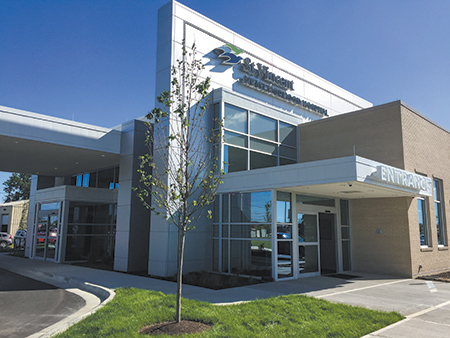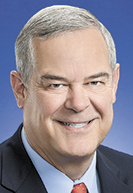Subscriber Benefit
As a subscriber you can listen to articles at work, in the car, or while you work out. Subscribe NowIt was an announcement full of hope and promises.
On May 6, 2022, the leaders of Purdue University, Ascension St. Vincent and the city of West Lafayette issued a joint statement announcing plans to build a “neighborhood hospital” in the Discovery Park District at Purdue.
For the first time, West Lafayette would have a local hospital, saving college students and neighborhood residents a 20-minute drive to the nearest hospital, Indiana University Health Arnett across the Wabash River in Lafayette, for emergencies or overnight care.
Mitch Daniels, then-president of Purdue, said the addition of a new medical facility was an important piece of the growing Discovery Park District.
“When we first envisioned this new live, work, play district, access to health facilities was among the priorities,” Daniels said in the announcement. “Ascension St. Vincent has stepped up to provide this much-needed new option for residents of our entire region.”
Six months later, officials from the three institutions donned white hard hats and broke ground with golden shovels near the intersection of Airport Road and U.S. 231. They predicted the small hospital, with eight emergency department treatment rooms, eight inpatient beds, laboratory and imaging services, would be up and running by early 2024.
But two years after the groundbreaking, the planned $25 million development has little to show for itself. The 7-acre site sits empty, with no indication that anything is coming soon.
The leaders of all three institutions involved at the time of the announcement—Daniels at Purdue, Jonathan Nalli at Ascension St. Vincent and West Lafayette Mayor John Dennis—have all left their positions, either through retirement or a change of jobs.
It remains unclear whether a new hospital is ever coming to West Lafayette and, if so, what it will look like or when it will happen.
The Purdue Research Foundation, a private nonprofit that supports the university’s intellectual property and promotes entrepreneurial activity, is “actively working” with Ascension on plans at that location, Purdue spokesman Trevor Peters said in an email to IBJ.
Peters declined to provide more specifics, referring IBJ questions to Ascension.
But Ascension St. Vincent declined to offer specifics. Stephan Masoncup, chief strategy officer for the Indiana hospital system, told IBJ in an interview this month that it “is deep into conversations” with Purdue about what kind of services to provide. He declined to offer an overview of possible options.
“We’re reimagining exactly what that might look like, and we’re hoping to really break ground, probably in the 2025 calendar year, on a facility,” Masoncup said. “Whether or not that is a micro-hospital or some other care facility is going to be dictated, ultimately, by the needs of the community.”
A spokesman for Ascension St. Vincent told IBJ in an email this week that it is “finalizing plans” for health care services in West Lafayette. He did not offer details or a timeline.
One longtime hospital observer in Indianapolis, however, said it’s possible Ascension St. Vincent’s parent, St. Louis-based Ascension Inc., never fully signed off on the original deal.
“Maybe it wasn’t totally vetted by management, so that could explain why it’s been a little slower in coming,” said Ed Abel, retired director of health care practice at Indianapolis-based Blue & Co., an accounting and consulting firm.
Ascension Inc. leaders did not return two telephone calls to comment on the situation.
Services still needed
Just four months after the hospital groundbreaking at Purdue Discovery Park, Ascension announced that Nalli, would be “transitioning out of his role” as the top Ascension executive in Indiana. It has never given any details about his departure.
Nalli, now owner of Crossroads Momentum LLC, an Indianapolis-based consulting firm, declined to comment last week about why the West Lafayette hospital project has stalled.
“I don’t have any information on that project, so I couldn’t help you,” he told IBJ by phone.
Nalli was later succeeded by Kevin Speer, then-president and CEO of Hendricks Regional Health, who was given the title of CEO of Ascension’s Indiana operations and senior vice president for the parent company.
Whether Speer or another Ascension official decided to put the brakes on the West Lafayette project is unclear. A spokesman for Ascension St. Vincent did not have an immediate comment on the situation.
If the project were to stall indefinitely, that would likely be a disappointment to West Lafayette city officials. John Dennis, who retired as mayor last year after serving 16 years, had praised the hospital project as much needed.
“The city of West Lafayette has been working toward bringing expanded medical services to the area for several years,” Dennis said in the 2022 joint statement. “Our growing permanent resident and student population has demonstrated the need for a comprehensive health facility in a convenient and accessible location. We’re excited to welcome Ascension micro-hospital to the Discovery Park District at Purdue University and the city of West Lafayette.”
Dennis did not return two telephone calls to his cellphone this month to comment on the apparent change in plans.
The office of Mayor Erin Easter, Dennis’ successor, referred IBJ to the city’s department of development. The department director, Jen Van Schuyver, said the city has not had any serious conversations with Ascension recently and was unaware of the health system’s plans.
“We’re certainly still hoping they can build a hospital,” she said. “This city needs an emergency room, an ICU and other hospital services, so people don’t have to go across the river for their care.”
If Ascension St. Vincent were to radically overhaul the original plan for a small hospital in West Lafayette, that could mean a final blow to the hospital system’s grand experiment with tiny, street-corner hospitals, which it originally rolled out less than a decade ago.
In 2017, the hospital system announced it would open eight tiny hospitals in Indianapolis in addition to locations in Noblesville, Plainfield, Avon and other suburbs. Officials touted the sites as a new model of ease and comfort for patients.
“Health care is evolving. Patients want convenience,” Nalli said at the time. “We will stay ahead with hospitals like this.”
The hospitals, at 17,000 square feet—about the size of an Aldi grocery store—were designed for emergencies that weren’t life-threatening, with seven exam rooms, eight overnight beds, a laboratory, a pharmacy, and an imaging suite equipped with an X-ray machine and CT scanner.
And unlike traditional, large hospitals that are often set back hundreds of feet from the street on enormous medical campuses, this was up against the road where patients could get in and out quickly.
Micro-hospitals burst onto the scene about a decade ago, the latest push by health systems to compete for patients. With the small, outlying hospitals, health systems could ring up more business on low-acute emergencies, such as stomach bugs or a fall down the steps, while referring more serious cases to their flagships.
It was part of a multimillion-dollar strategy to upend the traditional hospital model to attract more patients in a competitive market. Yet nearly right away, the project ran into problems.
Ascension St. Vincent’s partner on the project, Tandem Hospital Partners LLC of Houston, which ran most of the operations and staffed the nursing stations, labs, pharmacies and business officers, went out of business two years after the announcement.
That caused Ascension St. Vincent to scramble to take over the operations and offer jobs to the Tandem workers.
Only five of the eight planned hospitals ever opened. Several of the others were converted to other uses, including freestanding emergency rooms, primary care clinics and an imaging center—none with inpatient beds.
It remains unclear whether the small hospitals met Ascension St. Vincent’s revenue or patient count projections.
Abel said Ascension St. Vincent apparently moved too quickly with an untested model.
“It was one of the biggest flops I’ve ever seen,” he told IBJ.•
Please enable JavaScript to view this content.







So glad to hear that one of the biggest private insurance fleecing operations continues to crash and burn.
Wake up people, St V’s is NO LONGER an Indiana focused organization, unless of course you mean take all of the money out of Indiana and fund your other out of state organizations. The number of Indiana residents that still don’t understand that St V’s positive cash flow LEAVES this state, as it isn’t proportionally invested back into the health and well being of Indiana still astounds me! Ascension loves the “sick care” system (admittedly that is what most Americans are only willing to pay for) and these micro hospitals (sic) are the most glaring examples in many many years!